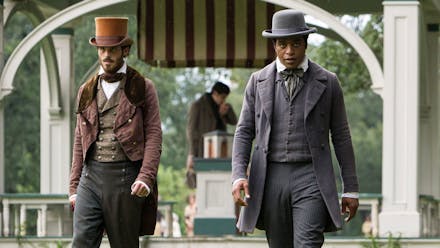In outline, 12 Years A Slave might sound like an attempt to wring a feel-good movie out of one of history’s most feel-bad tragedies. The true story of Solomon Northup, shanghaied from his family into slavery only to survive 12 years of unthinkable hardship, could be parlayed into an uplifting triumph-over-adversity drama, filled with grandstanding moments, sweeping strings and manipulative tear-jerking. Yet Steve McQueen’s third film, following the Michael Fassbender-centric Hunger and Shame, has little truck with peddling easy sentiments or redemptive narratives. Instead, it is an excoriating experience, at once bruising yet refined and remote, that (mostly) takes the histrionic out of history.
If detailing the darkest recesses of 19th-century America feels like a departure for McQueen (he grew up in ’70s Ealing), 12 Years A Slave still shares connective tissue with his previous work. Both Hunger and Shame were compelled by corporeality, be it the transforming effects of starvation or sex on the flesh. 12 Years... doesn’t shy from showing the effects of brutality on the body, the sheer physicality of slavery, from a whipping scene where a circling camera reveals the horrifying extent of the punishment to a hanging where Northup dangles for several minutes in long shot, while the plantation blithely goes about its business in the background. Occasionally, McQueen holds on imagery to create an almost abstract metaphorical beauty — the white water churned up by the paddle of a slave ship, the blood-like raspberry juice on Solomon’s silver bowl that may have a practical use later, the dying orange embers of a letter fading like Northup’s hope — but the images are mostly stark in their realism, unflinching in their gaze. It’s Django Unchained without the cackle and glee.
If 12 Years… lacks the formal boldness or sense of rigour of McQueen’s previous work, it is not by-the-numbers prestige filmmaking either. McQueen and screenwriter John Ridley serve up a litany of horrors and humiliation — it starts with Paul Giamatti’s slave trader pulling and prodding naked slaves at a market and gets much, much worse — with only snatched moments of grace, a biblical reading here, a surprise run-in with Native Americans there, as respite. There is a hint of a Hitchcockian wrong-man-accused inherent in the premise but McQueen never plays on such frisson. Every emotion, both good and bad, is dampened, then quashed, by despair.
Following his kidnapping and selling in Washington, D. C., Northup is passed through three plantation owners: Benedict Cumberbatch’s Ford offers him responsibility, a violin and some kindness and therefore might be the cruellest of all Northup’s enslavers; Bryan Batt’s Judge Turner is mysterious and effeminate. Yet it is Fassbender as the middle master, malicious Edwin Epps, whose domineering turn threatens to throw the rest of the film off-kilter. Fassbender starts Epps as a drunk, sadistic, borderline cartoonish “slave breaker” yet gradually adds colours, from his strained relationship with his wife (a terrific Sarah Paulson) to his tenderness towards slave Patsey (Lupita Nyong’o, who gives one of the most committed big-screen debuts imaginable) to his deep-seated self-loathing.
Surrounded by the likes of Fassbender, Giamatti, Paul Dano (as a sadistic plantation lackey), Garret Dillahunt (as a helping hand) and a distracting Brad Pitt (as a fervent abolitionist), Ejiofor more than holds his own. McQueen asks a lot of him — a strange extended close-up just on Ejiofor’s face; a terrific scene in which Patsey asks him the impossible — but he delivers the goods. Ejiofor’s Northup feels determined without ever articulating it, his battle to retain his individuality moving rather than mawkish — watch him struggle to resist singing along with spirituals as the slaves work. Some might argue over the validity of making a film that concentrates on the rare survivor rather than the millions that died, but such carping misses the point: you can’t mistake 12 Years A Slave for anything other than the genuine, intelligent, sobering experience it is.








